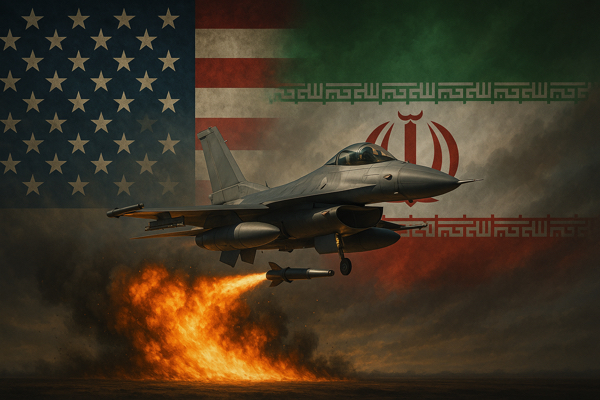 Parler
Parler Gab
Gab
- A senior U.S. official warns Israel is using its advanced ballistic missile interceptors, including Arrow 2 and 3, at an unsustainable rate as the conflict with Iran enters its fifth day.
- Israel's layered air defense system is being stretched thin, especially the Arrow and Stunner interceptors, which are costly and difficult to replenish quickly.
- Analysts said Israel's interceptor reserves were already strained from previous engagements in 2024, including with Iranian proxies and may soon require rationing to manage shortages.
- Israel is reportedly spending around $285 million per night on missile defense, leading to questions about how long it can sustain current operations without external resupply, particularly from the United States.
- Experts warned that any expansion of the war, especially U.S. involvement, could deplete missile interceptor inventories in both Israel and the U.S., limiting their ability to respond to further threats.
Analysts: Israel-Iran conflict won't last long as missile exchange strains both sides
For the fifth consecutive day, the skies over Israel have been lit with the high-stakes choreography of modern warfare: a storm of Iranian ballistic missiles cutting through the air, met by a web of Israeli defensive interceptors scrambling to shield the country from devastation. What began with a surprise Israeli strike deep inside Iran on June 13, a coordinated assault by covert operatives and fighter jets, has now evolved into a grueling exchange of firepower that analysts said neither side may be able to sustain for long. According to Israeli intelligence estimates, Iran began the conflict with around 2,000 missiles capable of reaching Israel from up to 1,200 miles away. But early strikes by Israel reportedly destroyed a significant share of that arsenal. Since then, Iran has launched approximately 400 missiles, while Israeli strikes have knocked out about 120 missile launchers, or one-third of Iran's capacity to fire. Military officials in Tel Aviv said Israel has achieved "air superiority over Tehran" earlier than expected, further constraining the ability of Iran to launch coordinated attacks. This strategic edge appears to be paying dividends. After a massive barrage of more than 150 missiles on the war's opening night, the firepower of Iran has dwindled. By Tuesday afternoon, June 17, only 10 missiles were fired. "Iran has to make a very, very difficult calculation because they have a limited amount of missiles, and considering the rate of fire, they cannot replenish in real time," said Fabian Hinz, a military analyst with the International Institute for Strategic Studies. Still, the threat is far from over. Israeli officials warn that more than half of Iran's missile stockpile remains and unknown quantities may be hidden in underground depots. With Iran possibly adjusting tactics to preserve its remaining arsenal, Israeli defense planners face a different kind of challenge: cost. Each night of missile defense operations is estimated to cost Israel nearly one billion shekels or about $285 million according to The Marker, Israel's leading financial daily. That kind of spending, coupled with the wear on missile defense systems, raises concerns about how long Israel can continue intercepting missiles at its current success rate. An individual familiar with joint U.S.-Israeli intelligence assessments, who spoke on condition of anonymity due to the sensitivity of the information, said Israel may only be able to sustain its current defense posture for another 10 to 12 days and even less if Iran intensifies its attacks again. Learn more about the ongoing conflicts involving Israel at WWIII.news. Watch this report discussing Houthi claims about attacking U.S. Navy destroyers in the Red Sea. This video is from the Treasure Of The Sun channel on Brighteon.com.More related stories:
Yemen's Houthis launch hypersonic ballistic missile targeting Tel Aviv.
Hezbollah fires BALLISTIC MISSILE targeting Mossad headquarters in Tel Aviv.
Yemen's Houthis attack bulk carrier in Red Sea with suicide drone boat – first time in this conflict. Sources include: MiddleEastEye.net WaPo.com Brighteon.comIranian media dismisses Trump’s claims of nuclear facility destruction
By Zoey Sky // Share
Maersk to cut ties with companies linked to illegal Israeli settlements
By Laura Harris // Share
By Lance D Johnson // Share
Bannon’s bombshell: Fox News faces scrutiny over alleged ties to foreign influence
By Belle Carter // Share
Governments continue to obscure COVID-19 vaccine data amid rising concerns over excess deaths
By patricklewis // Share
Tech giant Microsoft backs EXTINCTION with its support of carbon capture programs
By ramontomeydw // Share
Germany to resume arms exports to Israel despite repeated ceasefire violations
By isabelle // Share










